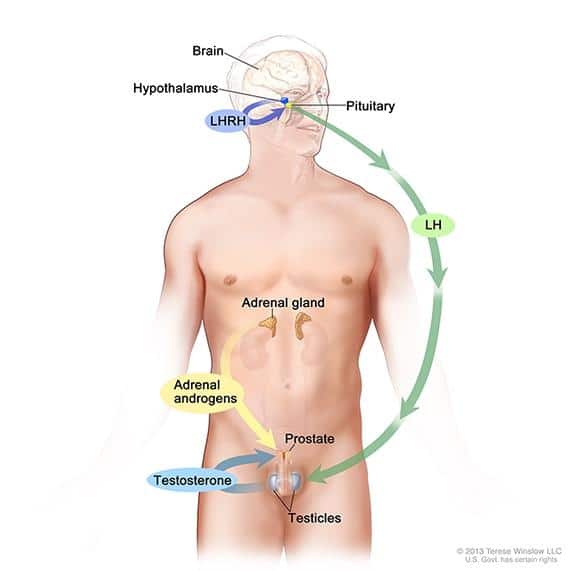Table of Contents
Androgen deprivation therapy (ADT) uses surgery or medicines to lower the levels of androgens made in the testicles.
What are male sex hormones?
Hormones are substances made by glands in the body that function as chemical signals. They affect the actions of cells and tissues at various locations in the body, often reaching their targets by traveling through the bloodstream.
Androgens (male sex hormones) are a class of hormones that control the development and maintenance of male characteristics. Testosterone and dihydrotestosterone (DHT) are the most abundant androgens in men. Almost all testosterone is produced in the testicles; a small amount is produced by the adrenal glands. In addition, some prostate cancer cells acquire the ability to make testosterone from cholesterol.
Hormone therapy for prostate cancer uses surgery or drugs to lower the levels of male sex hormones in a man’s body. This helps slow the growth of prostate cancer.

When to use hormone therapy?
Hormone therapy is almost never used for people with Stage I or Stage II prostate cancer.
It is mainly useful for:
- Advanced cancer that has spread beyond the prostate gland
- Cancer that has failed to respond to surgery or radiation
- Cancer that has recurred (also called “relapsed” or “come back”)
It may also be useful for:
- Before radiation or surgery to help shrink tumors
- Along with radiation therapy for cancer that is likely to recur
Surgery to lower androgen levels
Orchiectomy is a surgical procedure to remove one or both testicles. Removal of the testicles can reduce the level of testosterone in the blood by 90 to 95%. This type of treatment, called surgical castration, is permanent and irreversible. A type of orchiectomy called subcapsular orchiectomy removes only the tissue in the testicles that produces androgens, rather than the entire testicle.
Drugs that lower androgen levels
The most common treatment is to take drugs that lower the amount of androgens made by the testicles. They are luteinizing hormone-releasing hormone (LH-RH) analogs and antagonists, and anti-androgens (oral tablets). These drugs lower androgen levels just as well as surgery does. This type of treatment is sometimes called “chemical castration.”
Men who receive androgen deprivation therapy should have follow-up exams with the doctor prescribing the drugs:
- Within 3 to 6 months after starting therapy
- At least once a year, to monitor blood pressure and perform blood sugar (glucose) and cholesterol tests
- To get PSA blood tests to monitor how well the therapy is working
LH-RH analogs are given as a shot or as a small implant placed under the skin. They are given anywhere from once a month to once a year. These drugs include:
- Leuprolide (Lupron, Eligard)
- Goserelin (Zoladex)
- Triptorelin(Trelstar)
- Histrelin (Vantas)
LH-RH antagonists are either given as pills or a shot. These reduces androgen levels more quickly and tend to have fewer side effects. These include:
- Degarelix (Firmagon), a shot given once a month
- Relugolix (Orgovyx), a pill taken once a day
Some doctors recommend stopping and restarting treatment (intermittent therapy). This approach appears to help reduce hormone therapy side effects. However, it is not clear if intermittent therapy works as well as continuous therapy. Some studies indicate that continuous therapy is more effective or that intermittent therapy should only be used for select types of prostate cancer.
Surgery to remove the testicles (castration) stops the production of most androgens in the body. This also shrinks or stops prostate cancer from growing. While effective, most men do not choose this option.
Drugs That Block Androgen
Some drugs that work by blocking the effect of androgen on prostate cancer cells. They are called anti-androgens. These drugs are taken as pills. They are often used when medicines to lower androgen levels are no longer working as well.
Anti-androgens include:
- Flutamide (Eulexin)
- Enzalutamide (Xtandi)
- Abiraterone (Zytiga)
- Bicalutamide (Casodex)
- Nilutamide (Nilandron)
Drugs That Stop the Body From Making Androgens
Androgens can be produced in other areas of the body, such as the adrenal glands. Some prostate cancer cells can also make androgens. Three drugs help to stop the body from making androgens from tissue other than the testicles.
Two medicines, ketoconazole (Nizoral) and aminoglutethimide (Cytradren), treat other diseases but are sometimes used to treat prostate cancer. The third, abiraterone (Zytiga) treats advanced prostate cancer that has spread to other places in the body.
When Hormone Therapy Stops Working
Over time, prostate cancer becomes resistant to hormone therapy. This means that cancer only needs low levels of androgen to grow. When this occurs, additional drugs or other treatments may be added.
Side Effects
Androgens have effects all over the body. So, treatments that lower these hormones can cause many different side effects. The longer you take these medicines, the more likely you are to have side effects. They include:
- Trouble getting an erection and not being interested in sex
- Shrinking testicles and penis
- Hot flashes
- Weakened or broken bones
- Smaller, weaker muscles
- Changes in blood fats, such as cholesterol
- Changes in blood sugar
- weight gain
- Mood swings
- Fatigue
- Growth of breast tissue, breast tenderness
Androgen deprivation therapy can increase the risks for diabetes and heart disease.
Weighing the Options
Deciding on hormonal therapy for prostate cancer can be a complex and even difficult decision. The type of treatment may depend on:
- Your risk for cancer coming back
- How advanced your cancer is
- Whether other treatments have stopped working
- Whether cancer has spread
Talking with your provider about your options and the benefits and risks of each treatment can help you make the best decision for you.
Alternative Names
Androgen deprivation therapy; ADT; Androgen suppression therapy; Combined androgen blockade; Orchiectomy – prostate cancer; Castration – prostate cancer
